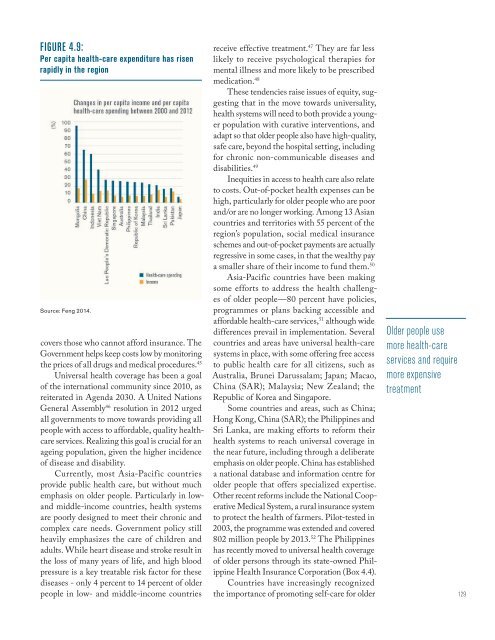SHAPING THE FUTURE HOW CHANGING DEMOGRAPHICS CAN POWER HUMAN DEVELOPMENT
1VPo4Vw
1VPo4Vw
You also want an ePaper? Increase the reach of your titles
YUMPU automatically turns print PDFs into web optimized ePapers that Google loves.
FIGURE 4.9:<br />
Per capita health-care expenditure has risen<br />
rapidly in the region<br />
Source: Feng 2014.<br />
covers those who cannot afford insurance. The<br />
Government helps keep costs low by monitoring<br />
the prices of all drugs and medical procedures. 45<br />
Universal health coverage has been a goal<br />
of the international community since 2010, as<br />
reiterated in Agenda 2030. A United Nations<br />
General Assembly 46 resolution in 2012 urged<br />
all governments to move towards providing all<br />
people with access to affordable, quality healthcare<br />
services. Realizing this goal is crucial for an<br />
ageing population, given the higher incidence<br />
of disease and disability.<br />
Currently, most Asia-Pacific countries<br />
provide public health care, but without much<br />
emphasis on older people. Particularly in lowand<br />
middle-income countries, health systems<br />
are poorly designed to meet their chronic and<br />
complex care needs. Government policy still<br />
heavily emphasizes the care of children and<br />
adults. While heart disease and stroke result in<br />
the loss of many years of life, and high blood<br />
pressure is a key treatable risk factor for these<br />
diseases - only 4 percent to 14 percent of older<br />
people in low- and middle-income countries<br />
receive effective treatment. 47 They are far less<br />
likely to receive psychological therapies for<br />
mental illness and more likely to be prescribed<br />
medication. 48<br />
These tendencies raise issues of equity, suggesting<br />
that in the move towards universality,<br />
health systems will need to both provide a younger<br />
population with curative interventions, and<br />
adapt so that older people also have high-quality,<br />
safe care, beyond the hospital setting, including<br />
for chronic non-communicable diseases and<br />
disabilities. 49<br />
Inequities in access to health care also relate<br />
to costs. Out-of-pocket health expenses can be<br />
high, particularly for older people who are poor<br />
and/or are no longer working. Among 13 Asian<br />
countries and territories with 55 percent of the<br />
region’s population, social medical insurance<br />
schemes and out-of-pocket payments are actually<br />
regressive in some cases, in that the wealthy pay<br />
a smaller share of their income to fund them. 50<br />
Asia-Pacific countries have been making<br />
some efforts to address the health challenges<br />
of older people—80 percent have policies,<br />
programmes or plans backing accessible and<br />
affordable health-care services, 51 although wide<br />
differences prevail in implementation. Several<br />
countries and areas have universal health-care<br />
systems in place, with some offering free access<br />
to public health care for all citizens, such as<br />
Australia, Brunei Darussalam; Japan; Macao,<br />
China (SAR); Malaysia; New Zealand; the<br />
Republic of Korea and Singapore.<br />
Some countries and areas, such as China;<br />
Hong Kong, China (SAR); the Philippines and<br />
Sri Lanka, are making efforts to reform their<br />
health systems to reach universal coverage in<br />
the near future, including through a deliberate<br />
emphasis on older people. China has established<br />
a national database and information centre for<br />
older people that offers specialized expertise.<br />
Other recent reforms include the National Cooperative<br />
Medical System, a rural insurance system<br />
to protect the health of farmers. Pilot-tested in<br />
2003, the programme was extended and covered<br />
802 million people by 2013. 52 The Philippines<br />
has recently moved to universal health coverage<br />
of older persons through its state-owned Philippine<br />
Health Insurance Corporation (Box 4.4).<br />
Countries have increasingly recognized<br />
the importance of promoting self-care for older<br />
Older people use<br />
more health-care<br />
services and require<br />
more expensive<br />
treatment<br />
129


